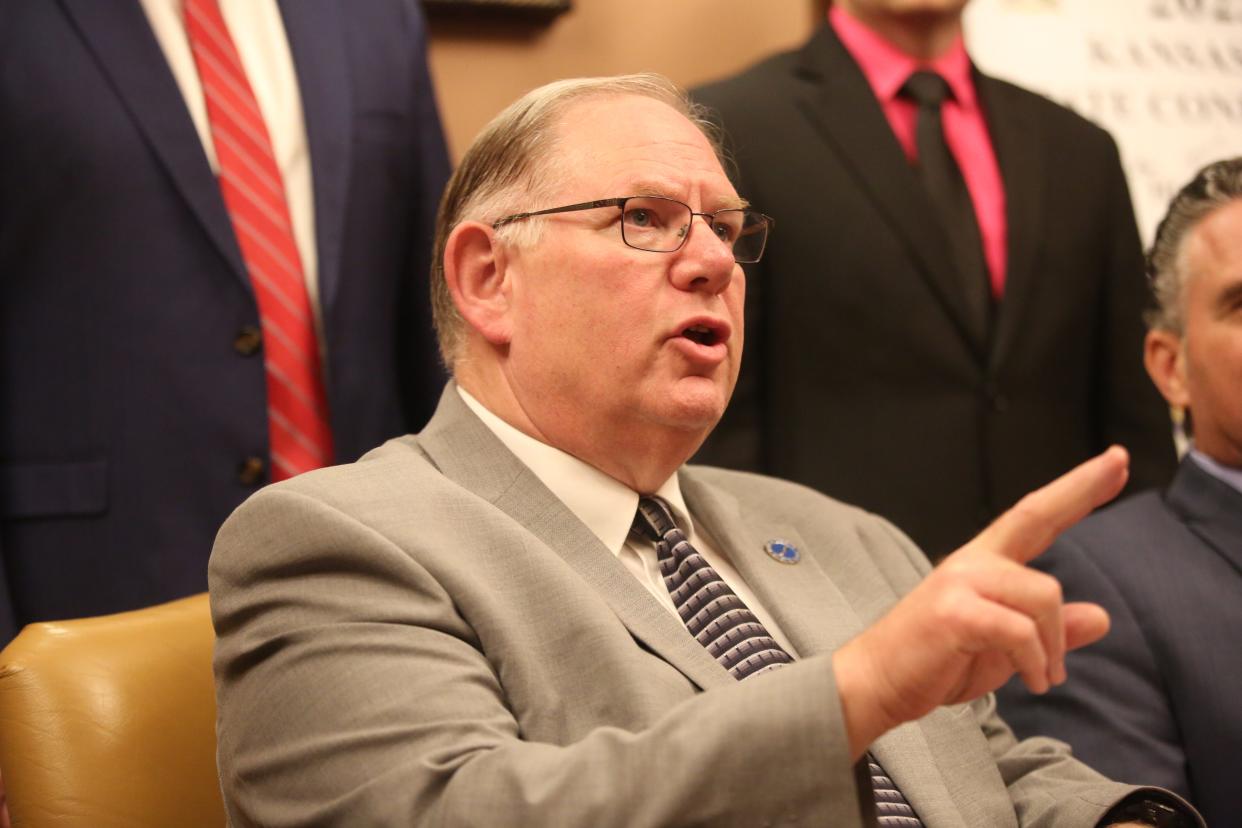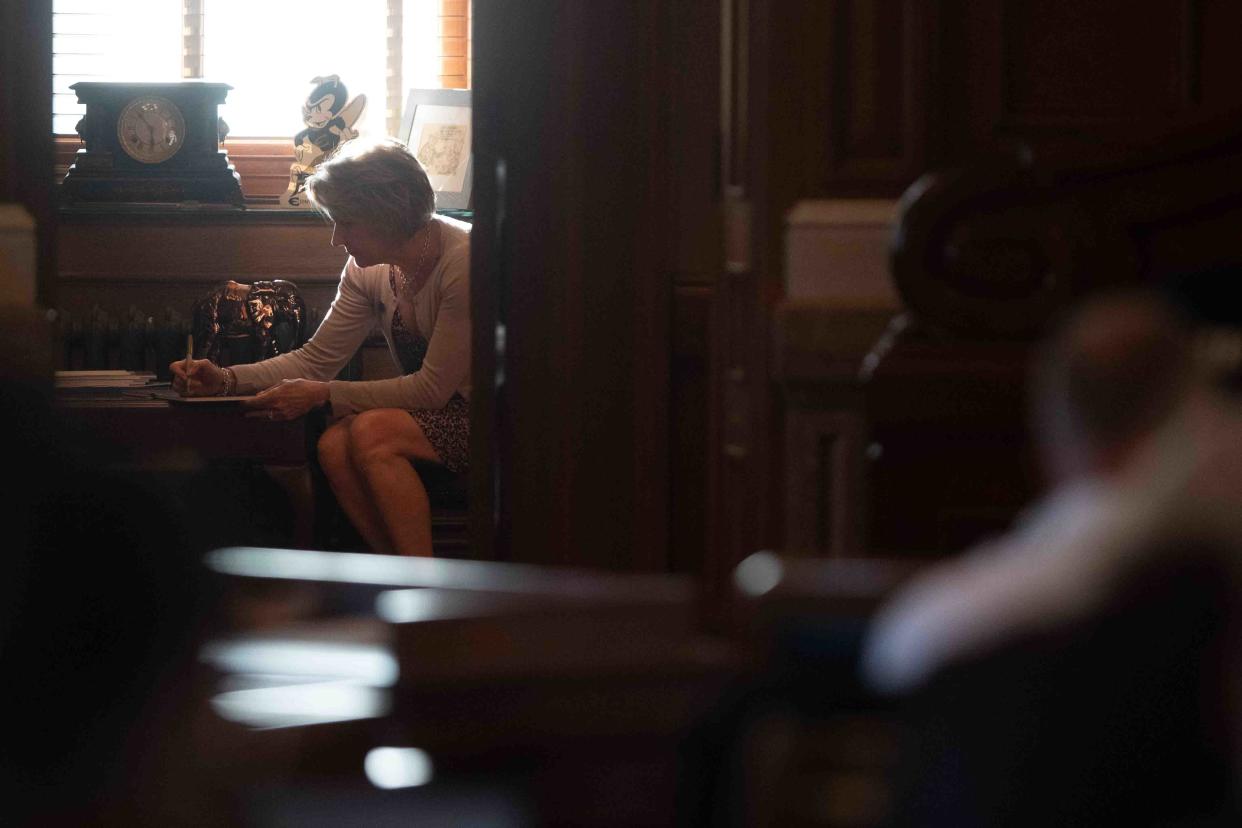Kansas lawmakers take away power from bureaucrats to impose regulations costly to business
Kansas lawmakers have taken power away from bureaucrats to impose regulations that are costly to businesses.
House Bill 2648 became law as the House voted 87-38 and the Senate voted 27-12 to override the veto of Democratic Gov. Laura Kelly.
"Kansas is highly regulated when it comes to rules and regulations," House GOP leadership said in a statement. "Many of those rules and regulations, that are put in place by unelected agency bureaucrats, end up costing taxpayers big money. By overriding the governor's misguided veto today, we're putting an extra set of guardrails on the big government spending of the rules and regulations process and standing up for Kansas taxpayers."
House Speaker Dan Hawkins, R-Wichita, Majority Leader Chris Croft, R-Overland Park, and Speaker Pro Tempore Blake Carpenter, R-Derby, referred to it as the "REINS Act," though the new law wasn't formally named that.

Elizabeth Patton, the state director for Americans for Prosperity-Kansas, also referred to it as the REINS Act. She called the veto override "a triumph for common sense and accountability in government" and said it will stimulate economic growth and create jobs.
In her veto message, Kelly contended that the new law makes state government more bureaucratic.
"House Bill 2648 would insert bureaucratic red tape intended to legislatively interfere with the timely implementation of necessary and important rules and regulations," she said. "Many of these regulations are for the protection and safety of Kansans."
What does the new Kansas law on rules and regulations do?
The law effectively prohibits the governor's administration from promulgating regulations that would cause $1 million or more in compliance costs over five years.
A state agency could only pursue such a regulation if the Legislature gave explicit approval by ratifying it through a bill that could only be introduced by a legislator. There are no provisions for doing such a ratification process outside of the legislative session.
Rep. Sean Tarwater, R-Stilwell, said the new law also requires "the director of the budget to take a second look at the economic impact statements that are being put forth by the agencies to make sure that they did their job correctly."
Tarwater said the bill is about helping businesses thrive and making it easier to start new businesses.
"We need to be cognizant of our business partners that pay the tax that we spend up here so easily," he said.
Rep. Jason Probst, D-Hutchinson, reiterated his past concerns that the evaluation of regulations shouldn't be limited to the cost on business. He argued that the lack of regulation can also be costly, citing examples of businesses polluting the environment.
"The absence of regulations do in fact cost taxpayer money," he said. "We saw that with the purchase of two homes in Butler County because of oil wells that polluted water, which we'll probably be taking up as a line item."
Probst was referring to a budget proviso that Kelly line-item vetoed that would have compensated two homeowners whose groundwater was contaminated by oil wells.
During a previous debate, Probst pointed to Hutchinson's $35 million project to address a pollution plume affecting the city's water wells. He blamed the absence of regulation preventing industry from pouring chemicals on the ground.
Probst suggested legislators will "be in the unenviable position of having to take a vote on many more in-the-weeds regulations," but Tarwater said lawmakers looking at more regulations is "a good thing."
New law comes after failed constitutional amendment
When vetoing the bill, Kelly reminded lawmakers that voters rejected a proposed constitutional amendment.
"Kansans voted no to giving the legislature veto power over rules and regulations in the November 2022 election," she said. "This is yet again another attempt by the legislature to undermine the will of the voters."
The new law is written in a way that supporters hope will avoid constitutional challenges.
The Legislature is barred from imposing a so-called legislative veto on administrative rules and regulations because of a 1984 Kansas Supreme Court decision that deemed such requirements an unconstitutional usurpation of separation of powers.
Republicans spearheaded a proposed amendment in 2022 to change the Kansas Constitution to allow legislative vetoes. Kansas voters narrowly rejected the constitutional amendment.
Top Republicans previously said they would try again, but no effort was made in 2023 or 2024.
Rep. Barb Wasinger, R-Hays, said 2025 may be the year, attributing the delay to the cost of elections.
"We have revamped that constitutional amendment," she said. "The problem with running it this year is there's so much money going towards elections and primaries, and we can't have the support of individuals and organizations that would help us get the word out."

Lawmaker discloses backroom deal to kill regulation to advance APEX
Current law requires economic impact statements, but lawmakers frequently are unimpressed with them.
Tarwater pointed to inadequate economic impact statements for substantial workers compensation regulations promulgated by the Kansas Department of Labor in 2021. Multiple legislators took issue with those proposals, and Wasinger told bureaucrats, "You will pay for this."
"We were able to kill that rule and regulation because there was a bill in play, and it was part of the negotiations," Tarwater said.
He disclosed in a House GOP caucus meeting that Kelly's administration stopped those regulations from going through as part of a deal with now-House Speaker Dan Hawkins, R-Wichita, to advance the APEX megaproject law that created subsidies to attract Panasonic to build its electric vehicle battery plant in DeSoto.
"We were not going to move that APEX bill until we got those rules and regulations killed," Tarwater said.
How did Topeka legislators vote?
Here's how Topeka legislators voted on overriding the veto of the bill:
Yea: Republican Sens. Brenda Dietrich, Rick Kloos and Kristen O'Shea, and Republican Reps. Jesse Borjon, Ken Corbet and Kyle McNorton.
Nay: Democratic Reps. John Alcala, Kirk Haskins, Vic Miller, Tobias Schlingensiepen and Virgil Weigel.
Jason Alatidd is a Statehouse reporter for The Topeka Capital-Journal. He can be reached by email at jalatidd@gannett.com. Follow him on X @Jason_Alatidd.
This article originally appeared on Topeka Capital-Journal: New Kansas law restricts costly government regulations on business
